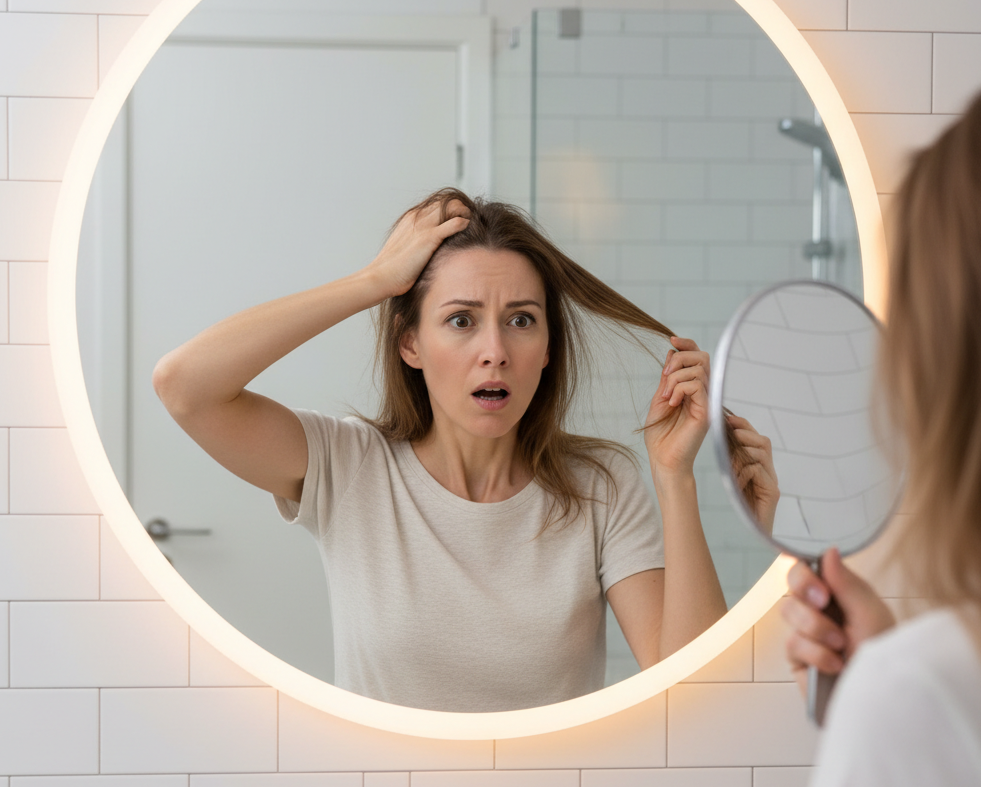
Why hair loss in women is so scary…
For many women, hair is far more than just strands growing out of the scalp — it’s a core part of identity, confidence, and self-expression. So when it starts to thin, even slightly, the emotional and physical impact can feel overwhelming. Hair thinning affects millions of women worldwide, yet it’s often treated as a taboo topic, leaving many to suffer in silence. Here are ten of the scariest things about thinning hair that women commonly face — and why they matter more than you might think.
1. The Sudden Realization That Something’s Changing
One of the most frightening moments is noticing that something isn’t quite right — perhaps your ponytail feels smaller, or more hair is left in the shower drain. Because hair loss is usually gradual, by the time it’s noticeable, it’s often already progressed. That first realization can trigger panic and a flurry of questions about what’s happening to your body.
2. The Fear of Losing Control
Hair thinning often feels like something happening to you rather than something you can manage. Whether it’s due to genetics, hormones, stress, or health issues, the lack of control is unsettling. Women are used to influencing their appearance with makeup or fashion, but when it comes to hair loss, the sense of helplessness can feel deeply personal.
3. The Blow to Self-Esteem
Society ties femininity, youth, and beauty to thick, healthy hair. When it starts thinning, many women report feeling less attractive or even “less like themselves.” That emotional blow can affect everything from how you show up socially to how you feel about intimacy. It’s not vanity — it’s about how hair shapes identity.
4. Worrying It Will Only Get Worse
Once thinning starts, many women spiral into fear about the future: Will I go bald? Will I need a wig? That anxiety can be constant, especially since hair loss often happens unpredictably. The not knowing — and imagining worst-case scenarios — is one of the hardest parts.
5. Feeling Alone and Embarrassed
Despite how common female hair thinning is, it’s rarely talked about openly. Many women feel isolated, embarrassed, or even ashamed, as if they’re the only ones going through it. This silence often delays seeking help, which can make the condition worse and deepen emotional distress.
6. The Stress of Finding the Cause
Hair thinning can stem from dozens of factors — from hormonal changes and nutritional deficiencies to autoimmune conditions. Identifying the cause often means doctor visits, blood tests, trial-and-error treatments, and lifestyle changes. That uncertainty and frustration can be exhausting, especially when results are slow to come.
7. Limited and Confusing Treatment Options
Once you know something’s wrong, figuring out how to fix it is its own challenge. Treatments range from over-the-counter serums to prescription medications, laser devices, and even surgery — but results vary widely. Sorting through the hype, misinformation, and conflicting advice is daunting, and many women fear wasting time and money with no results.
8. The Impact on Daily Routines
Hair thinning can change how you approach even the simplest tasks. You might start styling your hair differently to hide thinning spots, avoiding hairstyles you once loved, or spending extra time trying to make it look fuller. Over time, this constant awareness can drain your energy and confidence.
9. Unwanted Comments or Advice
Even well-meaning remarks like “It’s not that bad” or “Just try this shampoo” can sting deeply. Unsolicited comments make many women feel scrutinized or dismissed, adding another layer of stress and shame to an already sensitive experience.
10. The Emotional Rollercoaster of Hope and Disappointment
Perhaps the scariest part is the ongoing cycle of hope and heartbreak — trying new products, watching for regrowth, and feeling crushed when results fall short. This emotional toll can weigh heavily, affecting mental health and overall well-being.
Final Thoughts
Thinning hair is far more than a cosmetic concern — it’s an emotional journey that touches confidence, identity, and self-worth. If you’re experiencing hair thinning, know that you’re not alone, and it’s not something you have to silently endure. Talk to a dermatologist or trichologist, explore underlying causes, and remember that countless women are walking the same path. With the right information, support, and treatment, it is possible to regain both your hair health and your confidence.


Leave a Reply